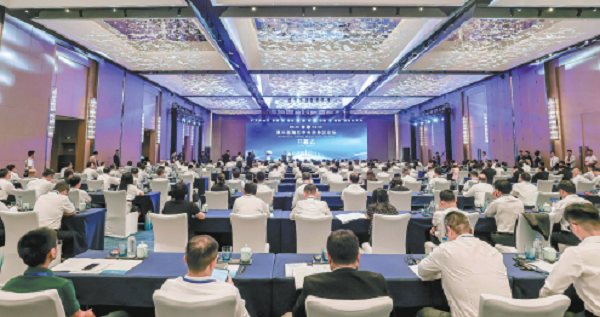Themed forum calling for support to boost Belt and Road development
Construction of area a win for law-based governance
The construction of the Maritime Silk Road Central Legal District plays an important role in the Belt and Road Initiative's development and the country's law-based governance, experts and officials said.
Law-based governance is essential for people's well-being, security and social stability, said Zhou Zuyi, Party secretary of Fujian province, during a speech at the third Forum of Maritime Silk Road Central Legal District held on Thursday in Xiamen.
In November 2021, the MSRCLD was launched in Xiamen, Fujian province, with an aim to participate in the construction of the BRI and support the law-based governance of the province.
With the joint efforts of all parties, the construction of the MSRCLD has achieved positive results and has become one of the iconic projects in the Maritime Silk Road's core area construction, Zhou said, adding that there are more legal experts from home and abroad gathering in Fujian, and a comprehensive and integrated legal ecosystem is taking shape.
Revolving around innovation, cooperation, opening-up and sharing, guests from home and abroad shared insights on integrating the legal construction into the BRI.
The MSRCLD was developed in response to a necessity, which is driven by the BRI vision and the construction of the China (Fujian) Pilot Free Trade Zone, said Shen Sibao, president of the society of international economic law under the China Law Society.
"The legal district was born and developed in response to the need to explore and build a first-class international business environment. It is exploring new experiences and creating new business models with innovative momentum, contributing leading and replicable experiences," Shen said.
He noted the legal district has made dedicated progress in its construction while focusing on market regulation, emphasizing commercial development and underlining the establishment of an international business system.
Bernard Dewit, chairman of the Belgian-Chinese Chamber of Commerce, said this forum has demonstrated China's emphasis on lawbased governance and its commitment to sustainable global economic development. It reflects the diverse commercial entities' demand for high-quality legal services.
Belgium and China mutually support each other in the Belt and Road Initiative, promoting bilateral economic and trade relations, Dewit said.
There are significant fundamental differences in terms of culture, politics, and investment environment among countries and regions involved in the BRI. The strengths and reliability of legal traditions and legal systems also vary greatly, Dewit noted.
In such a cross-border, cross-cultural situation, it is important that the methods of dispute resolution not only be suitable for the nature of the dispute but also be acceptable to all parties involved, he added.
It is great to see that the central legal district aims to provide legal services and support for cross-border investment and trade, empowering high-quality economic development, Dewit said.
Huang Huikang, a member of the International Law Commission of the United Nations, said, "Law-based governance is a crucial part of a country's competitiveness."
"The BRI has made remarkable achievements in legal safeguards over the past 10 years, preparing a solid foundation for the construction of the legal district. This presents a bright prospect while necessitating a higher demand," Huang said.
"The construction of the legal district is a magnificent, long-term, and challenging systematic project," Huang said. He suggested an in-depth integration of the legal safeguards of the BRI with a more focused effort on the Maritime Silk Road services.

Experts and officials attend the opening ceremony of the third Forum of Maritime Silk Road Central Legal District, which kicks off on Thursday in Xiamen, Fujian province. CHINA DAILY

Ministry of Justice of the
People's Republic of China
All rights reserved. Presented by China Daily.
京ICP备13016994号-2
